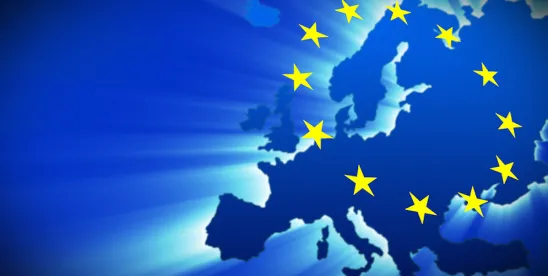This year of transition was marked by many milestones in EU politics, starting with the European Parliament elections. The outcome of the elections demonstrated significant shifts in the power structures, as analysed in our last client alert. More importantly, the months succeeding the elections were vital in determining the EU’s new political leadership, as well as the EU’s policy outlook for the coming five years. Ursula von der Leyen was reappointed as president of the European Commission, issued the Political Guidelines and this week announced the proposed composition of the College of Commissioners. We are analysing these key developments below as we embark into the last step before the next five-year policy cycle formally commences.
The Broader Framework
On 27 June, EU heads of state and government endorsed German centre-right politician Ursula von der Leyen for a second term as president of the European Commission. EU leaders also agreed on their Strategic Agenda 2024-2029, mandating the broader political guidelines for the next European Commission term, and building on the principles of a strong and resilient Europe. Ursula von der Leyen, based on the EU leaders’ Strategic Agenda, proposed the Political Guidelines 2024-2029, a first step towards a detailed policy agenda covering 2024 to 2029. Both the Strategic Agenda and Political Guidelines highlight the emphasis on:
• Competitiveness and technology
• Resilience and economic security
• Industrial policy
• Boosting the defence industry
• Livelihood, welfare and security
• Enlargement
• Implementation of adopted legislations (European Green Deal, Climate targets, etc.)
Ultimately, on 18 July, von der Leyen received the needed support from the European Parliament, being formally tasked to form the new political leadership of the Commission. Member States subsequently submitted the commissioner candidates over the course of the summer. After weeks of speculations on the allocation of the portfolios, the new College of Commissioners and the new five year policy agenda is starting to take shape.
European Commission Proposed College of Commissioners
Ursula von der Leyen unveiled, on 17 September, the proposed College of Commissioners, alongside the vision for each portfolio, and attributed tasks for each of the candidates. Comprising six executive vice presidents and 20 commissioners,1 von der Leyen opted for a similar power structure as the outgoing commission, albeit with a different set of responsibilities.
First Assessment
Unsurprisingly, the portfolios created have a strong focus on economic security and competitiveness, foreign economic policy, defence, industrial decarbonisation and investments. The environmental and climate policies, as well as digitalisation still remain prominent. Von der Leyen aspires to embed the European Green Deal policies within the EU’s growth strategy, while citing competitiveness, security and sustainability as the core of the future EU trade policy. It is evident that the policy priorities are closely interlinked with the numerous recommendations made by former Italian Prime Minister Mario Draghi, in the European Competitiveness Report1 issued on 9 September.
Von der Leyen has made strategic geographical considerations on the allocation of portfolios and actively considered the current geostrategic rivalries. A stark example is the emphasis on the Baltic and neighbouring states, where alongside former Estonian Prime Minister Kaja Kallas as high representative, Lithuanian Andrius Kubilius is appointed as commissioner for defence and space, Finnish Henna Virkkunen as executive vice president for tech sovereignty, security and democracy, and Polish Piotr Serafin as commissioner for budget, anti-fraud and public administration. All these portfolios contain strategic importance to control foreign affairs, defence, security and technology, in the wake of the continued conflict on EU borders, while at the same time ensuring control over the budget allocation for financing external action.
The executive vice president positions are attributed to four different political families represented by the candidates, ending speculations over where the powerful portfolios would be allocated. Another element worth noting is the overlap between the responsibilities of certain portfolios, which can lead to tensions and uncertainty. For instance, customs and taxation matters that fall into one directorate general, and were usually handled by the economy commissioner, would now be split into two and led by different commissioners: Slovak Maroš Šefčovič as commissioner for trade and economic security will be responsible for trade and customs issues, while Dutch Commissioner Wopke Hoekstra will resume the climate portfolio, as commissioner for climate, net zero and clean growth, and lead on all taxation policies.
One of the most powerful portfolios has been granted to Spanish Teresa Ribera, who has been appointed as executive vice president of a clean, just and competitive transition, with responsibilities to oversee environmental and sustainability files, as well as the coveted competition policies. Historically, the competition portfolio is one of the very sought-after portfolios. It also comes at a time where there was a gradual buildup over the years to revise the competition policy. With competitiveness being a central theme of the incoming mandate, easing competition policy will be a given, to enable companies to scale up in the global markets.
Former French Commissioner Thierry Breton resigned from his current role and the commissioner race at the last minute. Former French Foreign Affairs Minister Stéphane Séjourné was appointed immediately after, announced to be the executive vice president for prosperity and industrial strategy. France obtained an important portfolio, with responsibilities on competitiveness, a central issue of the EU’s mandate, as well as industrial and single market policies.
What To Expect in Terms of Policies
Von der Leyen’s vision for the policy portfolios and allocations have been outlined in mission letters she has given to each commissioner-designate. These contain a lot of information; we have distilled some of the key initiatives we expect to dominate the next five-year policy mandate into a selection of thematic fields:
Competitiveness/Single Market
• New Industrial Strategy, to tap into the economic and trade policies
• Clean industrial deal, including an Industrial Decarbonisation Accelerator Act
• Creation of a European Competitiveness Fund and a competitiveness coordination tool
• Funding for Important Projects of Common European Interest for strategic sectors and technologies
• Revision of the public procurement directives
• Horizontal Single Market Strategy, including a Single Market Barriers Prevention Act
• Setting up a Critical Raw Materials Platform
• Developing a Steel and Metals Action Plan
• Focusing innovation and research on strategic priorities
Sustainability
• Continued work to meet targets and objectives set by the European Green Deal
• Implementation of existing legal framework for 2030 (including on climate targets)
• Enshrining the 2040 90% emission reduction target in the European Climate Law
• Laying the groundwork to prepare for a net zero 2050 infrastructure and related investments
• European Climate Adaptation Plan
• Development of the Circular Economy Act
• Proposing an updated Bioeconomy Strategy
• Establishing a plan for a single market for sustainable products
• Chemicals industry package, including providing clarity on per- and polyfluoroalkyl substances (PFAS)
• European Water Resilience Strategy aiming to address the water security in Europe
• Incentives for investments in nature positive actions, nature credits and innovation
• Strengthened climate diplomacy
• Targeted decarbonisation from the revenues of the Emission Trading Scheme, buildup of a single market for CO2 and enhancing carbon removals
• Phasing out the use of fossil fuel subsidies
Energy
• Implementation of the existing legal framework for 2030
• Updating and simplify the governance of the Energy Union
• Action plan for affordable energy prices to address energy poverty and the housing crisis
• Emphasis on rolling out renewable energy and energy storage, including implementation of energy efficiency principles
• Electrification Action Plan towards net zero transition
• Roadmap towards ending Russian energy imports
• Pushing a clean energy investment strategy and infrastructure for Europe
• Legal framework on European grids
• Proposals to incentivise the uptake of carbon utilisation and storage
• Plan to phase out the use of fossil fuel subsidies
• Review of the security of supply framework
Tech/Digital
• Boosting AI, through capacity building, industrial use and research, to be implemented via an AI Factories initiative, an Apply AI Strategy and a European AI Research Council
• Investing in frontier technologies, namely supercomputer, semiconductors, quantum computing, etc.
• Developing an EU Cloud and Development Act aiming to boost the EU’s computational capacity
• Developing a long-term EU quantum chips plan
• Proposing a Digital Networks Act to improve access to secure, faster and reliable connectivity
• Effective enforcement related to the Digital Services Act and Digital Markets Act
• Simplifying and clarifying the legal framework on data, by means of a new European Data Union strategy
• Proposing a Space Data Economy Strategy
• Contributing to the broader EU-wide inquiry on the impact of social media, action plan against cyberbullying and determining the approach to the media from a democratic, cultural and commercial perspective
• Developing a Digital Fairness Act tackling – among other things – online profiling and focusing on the enforcement of product safety policies.
Trade
• Finalising outstanding trade negotiations
• Leading on clean trade and investment partnerships towards diversifying the EU’s supply chains
• Investing in international partnerships, trade and economic relations, namely with the UK, Switzerland, US, India, Indo-Pacific region, Latin America and the Caribbean and African partners; with respect to China, the policy shall be focused on derisking, not decoupling
• Customs Reform package, to better prepare for the implementation of the Carbon Border Adjustment Mechanism, including the creation of a new EU Customs Authority
• Strengthened approach to sanctions
• Continued use of trade defence instruments, with possibilities to further expand and reform the toolbox
• Developing an Economic Security Strategy, to include standards, export control elements and strategy to tackle outbound investments
Defence
• Development of a European Defence Union, including the implementation of a European Defence Industrial Strategy
• White paper on the future of European defence
• Reinforcing the European Defence Fund, with a focus to incentivise public and private investment in defence
• Strengthening EU-NATO partnerships
• Strengthening military mobility and dual-use transport infrastructure corridors
• Single Market for Defence, including improving the integration of small and medium-sized enterprises (SMEs) in supply chains
• Investing – in close cooperation with NATO – in defence projects of common European interest
Competition
• Modernising the EU’s competition policy
• New state aid framework for renewable energy, industrial decarbonisation, and manufacturing capacity of clean tech
• Reviewing of the Horizontal Merger Control Guidelines
• Simplification of state aid in many contexts, including housing
• Strengthening and speeding up enforcement and competition rules
• Enforcing the Foreign Subsidies Regulation
• Tackling anticompetitive practices
What Happens Now?
The announcement of the European Commission College of Commissioners does not mean this will be the final composition of the new hierarchical leadership.
All commissioners-designate will now go through parliamentary hearings by the respective committees in the European Parliament. Members of the European Parliament will prepare a series of questions for each candidate. These hearings are expected to start in early October and can run up to November. The hearings will be followed by a confirmation vote.
It is possible – and in this case expected – that a few of the candidates would not be approved. If this is the case, the Member State of the rejected candidate must appoint a new commissioner, and the hearing process shall be repeated.
For the new college to take office, all commissioners-designate must be approved by the respective committees, with a final confirmation vote of the entire College of Commissioners by the plenary session.
Subject to a final confirmation vote by the Parliament, it is anticipated that the new College of Commissioners will take office on 1 December 2024. However, it is still unclear if this timeline will be met, in case of possible rejections of proposed commissioners.
Conclusions
While the final composition of the College of Commissioners taking over at the end of the year is unclear, it is evident that there is an emphasis in pushing an agenda strongly influenced by the broader geopolitical uncertainties.
The proposed commissioners now face a divided European Parliament, which will not hesitate to reject certain candidates, for reasons that may not only be policy related: divisions over the allocation of positions per political party, for example, or the lack of a true gender parity among the commissioner candidates, as initially promised by von der Leyen.
The next five-year policy agenda will likely see many new initiatives across different sectors but ensuring continuity from the current mandate. Companies must now navigate not only the new policy agenda items and a large number of new stakeholders in town, but also the implementation of existing EU laws. There will be great deal of effort going into implementation of, and compliance with, what has been decided in the past legislature. A raft of secondary legislation, inherited from the previous policy period and essential to providing guidance for compliance and predictability, still awaits adoption.
Ultimately, aligning the Parliament, Council and Commission on new legislation might require considerable time and effort, especially in the wake of a more Eurosceptic European Parliament. Challenges therefore arise to understanding the regulatory and legislative landscape, and to determining how the new power dynamics will affect the legislative landscape going forward.
We excel at helping clients navigate the complex EU policy and regulatory maze, connecting the dots between the different portfolios and understanding the impact that forthcoming policies can have on their business. Companies must now reflect on how to approach the new mandate and set clear priorities for the future. We would be delighted to help you devise the best approach for this in order to manage both risks and opportunities emanating from the new EU leadership.








 />i
/>i

